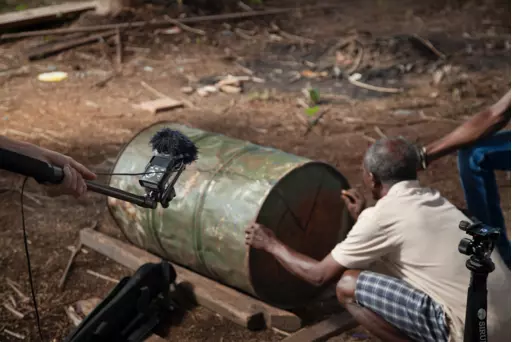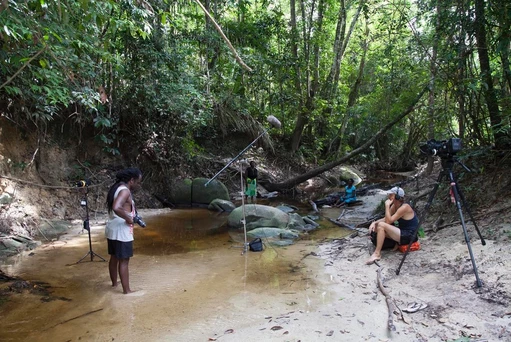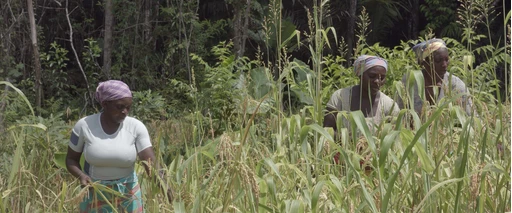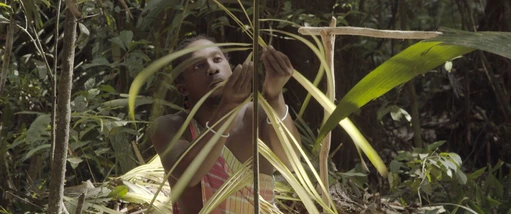Recap of online conversation 'Stones Have Laws'
videotopic: Stories from Rainforest by Lonnie van Brummelen and Siebren de Haan
trailer Stones Have Laws
“We went to Suriname, with the question: How can we make a film which is not continuing this colonial exploitation of stealing stories, of stealing images? How can we start working in a different way? And how can we make something together?”
Last year, ArtEZ studium generale showed Stones Have Laws (Dee Sitonu A Weti) as a part of their research program LAND: on climate, ownership and coexistence. The film tells a precious story about the ties between a Maroon community and the land with which they live in the former Dutch colony of Suriname. Scripted through a relation of trust with people of the community, the film weaves African ancestral traditions, stories of escaped slavery, contemporary rituals, and their ongoing struggle for attaining land rights in the face of industries that threaten to devastate the region through logging and mining. A claim for rightful relations between land and people, the film depicts how laws of nature prescribe a duty to care for and respect the land; to ask for permission before cutting down a tree or moving a stone, and to form a social contract that ensure that current uses of nature do not endanger its future sustenance for generations to come.
“We want to collaborate, but we want to collaborate in a way that benefits us. The way that benefits us is to tell our story to the world so that the world knows about us. One of the stories is about the land rights. If you do not know your position, and people do not know your histories, it is a kind of weakness.”
In the following excerpts from the video registration, filmmakers Lonnie van Brummelen, Siebren de Haan and Tolin Erwin Alexander discuss with moderator Kevin Headley how crucial it was for the film to support the land right struggle of the Maroon community. Until their land rights are recognised, the Maroon community continues to live with uncertainty, as the government displaces the Maroon communities for the extraction of natural resources such as petroleum, gold and bauxite. The film makers also spoke about how they developed a trustful relationship with the communities involved, which ensured that this film was told in rightful ways.
THE VOICE OF NATURE: In this clip, the filmmakers speak on working with the format of the cinema, and how they centred the sounds of nature in the editing of the film.
“What we discovered when we were making this film, is that We couldn’t separate human voice from the sounds of the rainforest. In the centre speaker we put the voice of the rainforest.”
HOW DID THIS START? In this clip Lonnie and Siebren describe how their immediate surrounding led them to investigate the questions they had about Suriname and the colonial history of the Netherlands.
LAWS OF NATURE: The filmmakers Lonnie and Tolin speak about the laws of nature, and how they determine day-to-day customs, and about how they influenced the making of the film.
“The film gives a certain peak into how [people of the Maroon community] live and communicate amongst [one another], but also with mother nature. I think that is one of the most important factors of our times—how you communicate with your surroundings and the respect you have.”
HESITANT TO WORK WITH PEOPLE FROM THE OUTSID: Tolin, Lonnie and Siebren speak on overcoming distrust in the collaboration.
BUILDING TRUST: Tolin speaks on how the Maroon people came to trust Lonnie and Siebren.
“Siebren and Lonnie came at the right period because right now is the period in which we as Maroons are looking for opportunities for how to preserve our stories.”
LAND RIGHTS: Kevin and Tolin speak on the current struggle for land rights by the Maroons in Surinam.


related content
blog – 13 jan. 2021
Living with Land Otherwise
This dossier questions worldviews and practices based on ownership and possession
refered to from:

